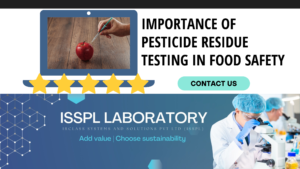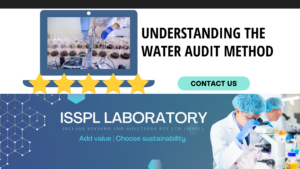An Overview by Team ISSPL - Analytical Testing Laboratory in India
ToggleSystematic crop production and successful farming depend on the health of the soil and its properties. The soil status and health are among the most crucial assets in the farming industry. The analyzed report of soil health inspection provides critical data that helps in crop production.
Different types and varieties of soil has distinctive properties. Even though you may not alter the soil texture, an analyzed report helps in making the best decisions for better production. In fact, farmers and crop production factories can always enhance the agricultural soil quality by monitoring and changing the different nutrients in the soil and its pH level. One of the critical factors for optimal soil management includes a consistent soil testing process.
Understanding soil testing
Soil testing or analysis is an influential part of the agricultural industry. It is an indispensable farm practice that helps recognize the accurate amount of crop nutrients available in the soil and its overall health. The soil analysis result also fetches an overview of the distinct chemical, physical, microbiological, and biological soil characteristics. The fundamental properties that get analyzed in the process include the following –
- It helps in the identification of the different levels of chemicals in the soil, like – nitrogen, phosphorus, potassium, Sulphur, magnesium, and calcium.
- It provides an in-depth overview of the pH level of the soil for ensuring better agricultural decisions.
- The process helps in the determination of the humus content in the soil, lime levels, and organic components.
The importance of soil testing
- Soil testing reports deliver valuable data necessary for agricultural soil quality improvement. The farmers and agricultural experts can ensure better tracking with accurate reports on soil nutrients.
- With the soil analysis report, a farmer can conveniently adjust and monitor the fertilization requirements for improved agricultural production. It helps in making upgraded decisions following the crop requirements and soil status. Experts can utilize farm management techniques and the latest software applications to monitor fertilization needs based on data from soil analysis. This way, it guarantees an optimum crop-yielding solution.
- Besides the farming angle, the soil analysis enhances the techniques of crop nutrient management by exhibiting the current soil pH level. The pH level of the agricultural soil is critical and influential for optimal crop growth.
- The purpose of pH monitoring in agricultural soil is to ensure better decision-making for the farmers. It helps in adjusting the soil and eliminating the toxic soil metals that could potentially harm the crops and their growth. Simply put, it helps in making the crop quality and production better.
Technicalities at a glance
Several factors ensure the utility and benefits of soil testing for agricultural production. For instance, soil sampling for annual crop production needs to be done after the harvest. It helps the farmer utilize the time and plan a robust fertilization management technique. Another critical aspect is to recognize the ideal time for soil analysis. For instance, the ideal time for testing the soil of perennial agricultural crops is at the dormancy stage.
The soil quality, balanced nutrient levels, and chemicals are vital for accomplishing a higher production volume. Thus, farmers need to collect soil samples consistently and carefully detect any changes that could impact the rate and quality of crop yield.
Experts recommend soil analysis and in-depth testing of the soil nutrient levels every three or four years. However, it is better to conduct soil analysis frequently, if feasible. Especially while harvesting the annual crops through rotation farming, the soil analysis should be conducted after every third farming rotation.
Recognize the benefits and objectives of soil testing
The growing benefits of soil testing and the systematic approach with the laboratory experts make it an indispensable choice for all farmers. Even from the trading point of view, the need for soil testing is critical for ensuring profitable decisions in the long run.
- Knowledge and analysis – Fertile and healthy soil quality are necessary to grow the best crops in terms of quality and quantity. One needs to measure the ingredients, components, and characteristics of the soil to enhance the agricultural requirements. Soil fertility gets determined through the chemical, physical and biological features of the soil. It may be the soil texture, color, and structure. Soil sampling and in-depth analysis determine the nutrient content and pH level. Simply put, you can obtain accurate data to ensure the improvement of the soil.
- Fertility management – Site-specific and whole-field soil testing methods are vital for ensuring optimal fertility management. It helps a farmer make cost-effective decisions in the long run and positively impacts the crop growth rate. One can minimize fertilizer expenditure as well. A well-planned and data-based soil fertility management strategy goes a long way to enhancing agricultural productivity. An efficient soil testing process helps eliminate the excess use of fertilizer that could potentially harm the crops and environment.
- Soil improvement – Soil degradation is a serious concern in the agricultural industry and to every farmer. Unbalanced soil management can destroy soil fertility and damage crop production. With soil testing facilities, one can find the best soil management through the balanced application of essential fertilizers as and when needed. The risks of soil degradation can be reduced, and it gets easy to spot the different effective ways of soil upgradation with a systematic approach.
Is it a wise step for the environment?
Soil testing can also improve the environment alongside soil upgradation. It can help restrict soil wearing by avoiding excess land usage for crop growth. Experts believe soil testing brings an efficient strategy to manage plant nutrients. The poorly nourished crops usually leave lesser plant residue. It helps in soil development and restricts soil erosion.
Closing Improve soil quality with ISSPL testing facilities.
Get the farm soil tested with expert assistance at ISSPL laboratories and ensure enhanced crop production. Better soil quality indicates an improved rate of crop production with enhanced quality. Get world-class testing facilities and an experienced team to manage the soil analysis steps for your farm and ensure optimal efficiency with ISSPL. Reduce the farming expense by making a prudent decision.







